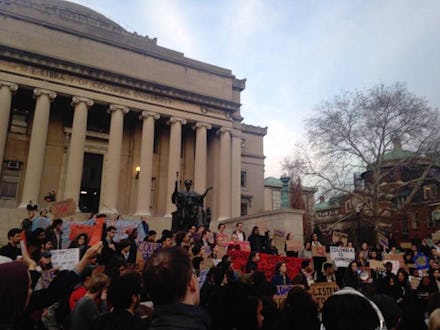Columbia University Activists Are Demanding Justice for Marginalized Students on Campus

Students across the country are refusing to tacitly accept their campuses' unjust, discriminatory policies and ethos, and Columbia University students are now no exception. On Monday, a coalition of students at the New York City-based university joined a growing national movement to counter campus-based discrimination by publicly announcing a list of demands for their administration.
The demands. "These demands all fundamentally challenge the way that the university has been acting as a corporation, paying administrators outlandish salaries and disregarding science and human well-being for the sake of profit," Caroline Lee — one of the organizers associated with the Barnard Columbia Solidarity Network, the coalition that wrote the demands — told Mic.
The demands were written by a coalition of multiple campus groups that seek to address the issues faced by students of color, sexual assault survivors, and low-income students, as well as students of other marginalized identities.
"None of these are single-axis issues," members of Mobilized African Diaspora (MAD), which describes itself as a group "organized to dismantle and restructure the racist university framework" wrote in a statement to Mic. "Working in solidarity with groups that address these various issues gives each of us a stronger voice."
Specifically, the students include among their demands an elimination of student contribution to tuition as well as an increase in student wages to $15 per hour; increased hiring of faculty of color across the university; an increased admission and retention rate of black students with an emphasis on low-income students of color; repair damage to local low-income neighborhoods affected by the university's expansion; as well as other demands related to the university's sexual assault-related resources and various investments.
These demands primarily address the broader systems of inequality in which students feel their administrators are complicit, but in doing so they ultimately address students' own lived experiences of discrimination and marginalization on campus.
"The ways that Columbia funds injustice off campus are tied up with the ways that it mistreats and exploits its own students, using marginalized students as props for diversity, while underpaying them for crucial labor and failing to invest in them," Lee said.
"We oppose the university's prioritization of profit over people, its consolidation of power in the hands of a few and its lack of transparent decision-making process," the organizers summarized in a statement of their demands.
A growing movement. While students have undoubtedly been organizing in various ways across the country for decades, several efforts have particularly garnered attention in recent weeks. Perhaps most notably, University of Missouri student Jonathan Butler went on a hunger strike in early November in response to his university president's failure to address racist incidents or demonstrate understanding of the challenges black students face, Mic's Zak Cheney-Rice reported. Soon after, football players of color on the school's team also went on strike in protest of racism on campus, the Nation reported. Their efforts were successful: the university's president Tim Wolfe ultimately resigned.
Students have also spoken out and protested evidence of racism on their campuses at Yale University, Georgetown University, Ithaca College and elsewhere. Just last Tuesday, Hamilton College students also demanded their administration address the needs of students of color, asking for the implementation of measures such as hiring more faculty members of color and a president of color, as well as improving admission rates of students of color, Mic's Marie Solis reported on Friday.
But they face backlash, too. While feelings of empowerment and radicalization are spreading among students, so is backlash among administrators. Some are interpreting their students' efforts and demands not as reasonable requests to address adversity and discrimination, but as the result of being overly coddled or politically correct.
"Is there no room anymore for a child or young person to be a little bit obnoxious ... a little bit inappropriate or provocative or, yes, offensive?" Erika Christakis, Associate Master of Yale University's Silliman College notoriously wrote in an email criticizing students' protest of racist or culturally appropriative Halloween costumes on campus before she ultimately resigned, the Atlantic reported. "American universities were once a safe space not only for maturation but also for a certain regressive, or even transgressive, experience; increasingly, it seems, they have become places of censure and prohibition," she added.
Oklahoma Wesleyan University President Everett Piper expressed a similar sentiment about students who feel "victimized" on campus on the college's website in November.
"Oklahoma Wesleyan is not a 'safe place', but rather, a place to learn," he wrote. Rather than "blame others for everything that's wrong with them," he suggested, students should learn they "need to grow up," before concluding, "This is not a day care. This is a university."
But at least on Columbia's campus, students are less concerned about criticism than they are with realizing their goals of broader justice. As Lee, of the Barnard Columbia Solidarity Network, concluded, "It's important for students on all campuses to recognize the ways that universities interact with the rest of society and can bring about social progress, and to know that they as students have the power to make their schools more socially conscious, more just and more educational."